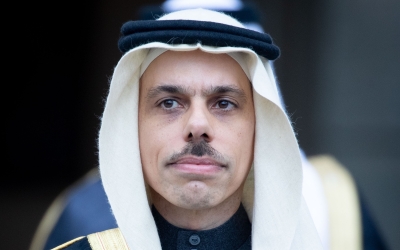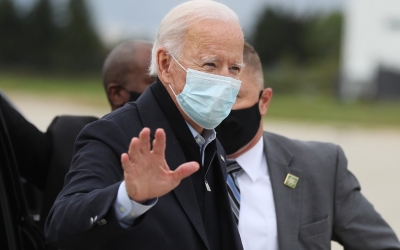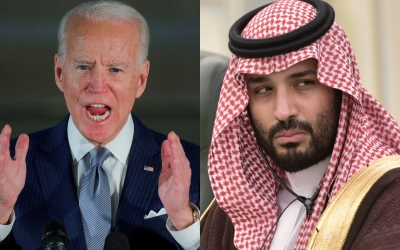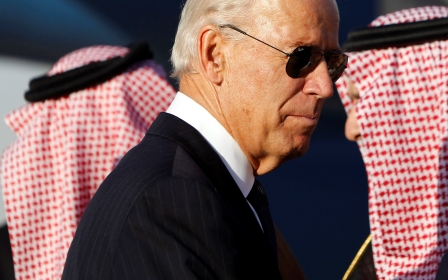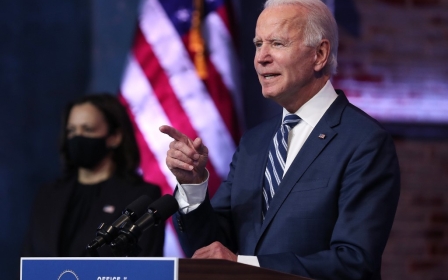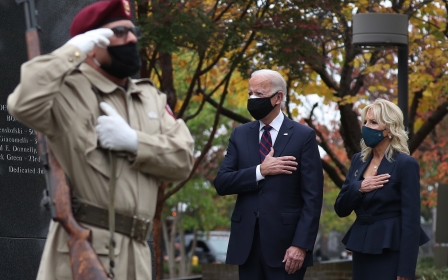Saudi prince urges Biden against rejoining Iran deal
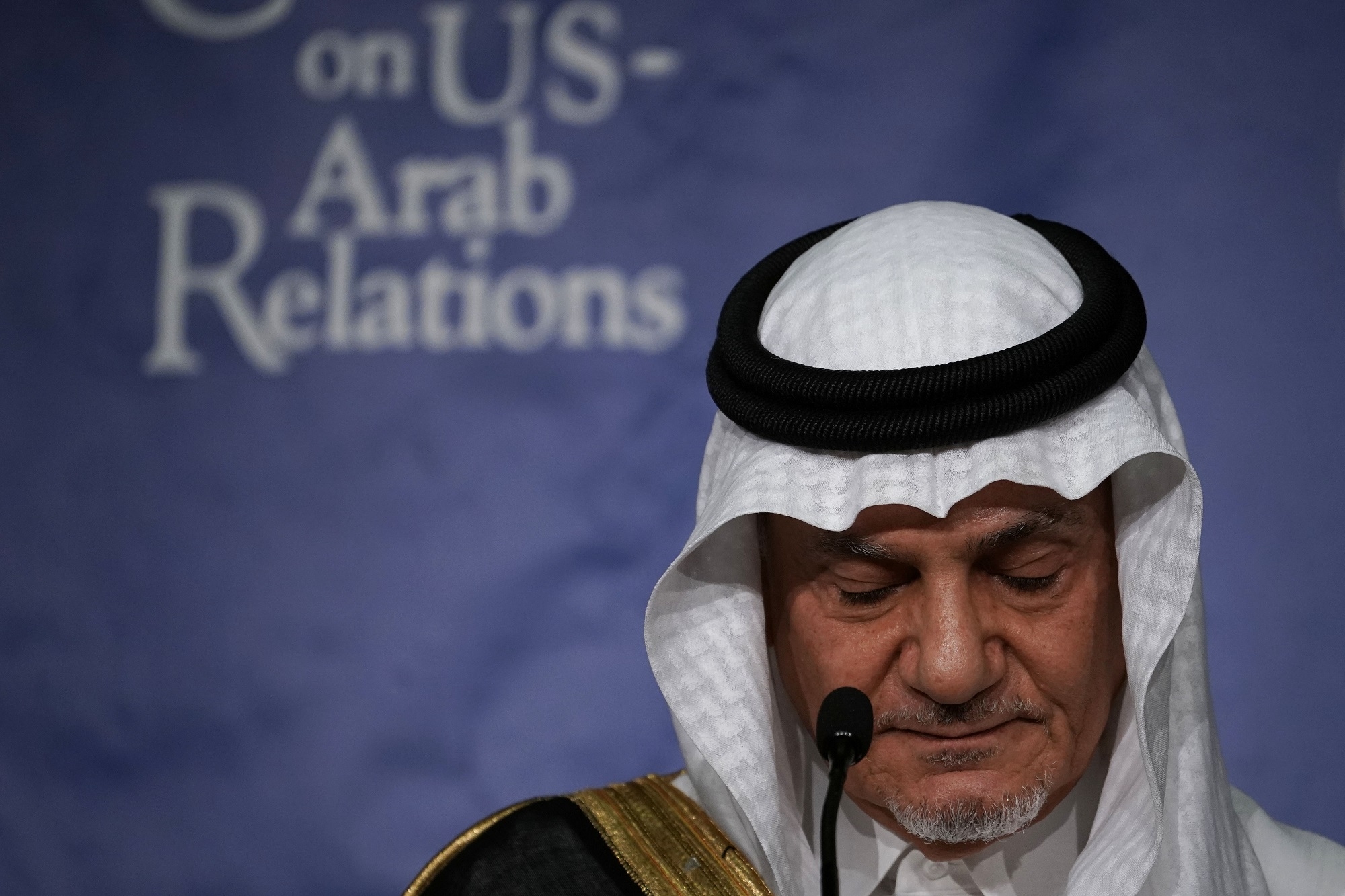
Senior Saudi royal Turki al-Faisal appeared to preemptively push back against the policies of US President-elect Joe Biden, urging the incoming Democratic administration on Tuesday against rejoining the Iran nuclear deal.
In an address to the National Council on US-Arab Relations, a Washington-based advocacy group, Prince Turki warned that an American return to the Joint Comprehensive Plan of Action (JCPOA) would harm the region's stability.
The multilateral accord saw Iran scale back its nuclear programme in exchange for lifting sanctions against its economy. President Trump nixed the deal in May of 2018.
Biden has vowed to abide by it again if Iran returns to full compliance to then start talks over broader issues.
But Prince Turki said comprehensive negotiations must take place before the reimplementation of the JCPOA.
"While we all aspire to have Iran back as a normal peaceful nation-state within the international community, the last 40 years experience with Iran's regime is not encouraging," the Saudi royal said on Tuesday.
"Therefore, rejoining the deal as it is would not do service to stability in our region."
He added that if Tehran gets sanctions relief, it would subject Washington to "blackmailing" when holding talks over the Iranian role in countries like Iraq and Syria.
"Drag negotiations is a part of the Iranian negotiating strategy," Prince Faisal said. "Negotiating the JCPOA took years to be accomplished while Iran worked on its nuclear program. Mr. President-elect, do not repeat the mistakes and shortcomings of the first deal."
'Legitimate concerns'
The prince, a former ambassador to the US and the UK who is the son of the late King Faisal, said the kingdom and other Gulf countries should be involved in future talks.
"Do not ignore the legitimate concerns of your friends and allies in the region. They must be part of negotiating a comprehensive plan to be assured that their strategic interests are taken into consideration."
Sina Toossi, a senior research analyst at the National Iranian American Council (NIAC), said Prince Faisal's remarks prove that Riyadh's main concern is not nuclear proliferation, which is addressed by the JCPOA.
Instead, Toosi said, the Saudi government fears that Iran may open up to the West and re-establish itself in the global economy, cementing its role as a regional power. "Their fundamental aim is to maintain the survival of this regime, of this autocratic monarchy."
He said Riyadh has always sought to quell any political or ideological regional influence that it sees hostile to its ruling system. "My main point is that it really is untenable. It goes against the popular will of the region; it goes against broader geopolitical factors."
Saudi Arabia has congratulated Biden, albeit belatedly, for his election victory. But the former vice president has had some tough words for the kingdom during his campaign.
During a debate last year, he called for stopping weapon sales to the kingdom and making its rulers "the pariah that they are".
The president-elect has also pledged to end US support for the Saudi-led war in Yemen. On the second anniversary of the murder of journalist Jamal Khashoggi, who was killed by Saudi government agents at the kingdom's consulate in Istanbul, Biden vowed to rethink US ties with Riyadh.
"Under a Biden-Harris administration, we will reassess our relationship with the Kingdom, end US support for Saudi Arabia's war in Yemen, and make sure America does not check its values at the door to sell arms or buy oil," Biden said last month.
"America's commitment to democratic values and human rights will be a priority, even with our closest security partners."
'Your country also has issues'
Still, on Tuesday, Prince Faisal laid out the case for strong US-Saudi ties, citing the energy market, trade and investments, the fight against terrorism and confronting Iran.
The Saudi royal hit out at the kingdom's American critics, suggesting that they should worry about human rights issues in their own country.
"As far as human rights are concerned, we admit that we have issues to improve, and we're working on that. It is a work in progress," he said.
"But respectfully, your country also has issues of human rights to improve upon - witness the turmoil during your elections and the police shootings. We, ladies and gentlemen, did not invent waterboarding. Your issues are also a work in progress."
Sarah Leah Whitson, the executive director of Democracy for the Arab World Now (DAWN), a rights group envisioned by Khashoggi and relaunched in Washington earlier this year, said the Saudi prince is merely saying, "what about?"
"There's nothing interesting about Turki al-Faisal trying to evade scrutiny of Saudi Arabia's human rights record by pointing to the fact that other governments have problematic human rights records," Whitson told MEE.
She added that Americans are in a special position to criticise Saudi Arabia's violations because their own government has close ties to Riyadh that enables such abuses to take place.
"The issue at stake here is the severity and magnitude of Saudi Arabia's abuses and the extent to which the United States is aiding and abetting these abuses by the Saudi government; the Saudi Arabian government is not aiding and abetting American abuses," Whitson said.
The rights advocate called on the incoming Biden administration to release the intelligence community's findings on who ordered the killing of Khashoggi.
Trump has refused to adhere to legally binding congressional requests for releasing a report on who ordered the killing.
"President Biden can with a stroke of a pen make this report public; that will do a tremendous amount to support accountability for Jamal Khashoggi's murder."
More broadly, Whitson called for a "dramatic rethink" of Washington's interests and partnerships in the Middle East.
She said some of America's "self-declared" allies, including Saudi Arabia, the United Arab Emirates and Israel are responsible for "gross human rights abuses" and violations of international humanitarian law.
"US support for these governments not only makes us complicit in the abuses but also creates terrible harm for the people of the region."
Middle East Eye propose une couverture et une analyse indépendantes et incomparables du Moyen-Orient, de l’Afrique du Nord et d’autres régions du monde. Pour en savoir plus sur la reprise de ce contenu et les frais qui s’appliquent, veuillez remplir ce formulaire [en anglais]. Pour en savoir plus sur MEE, cliquez ici [en anglais].


